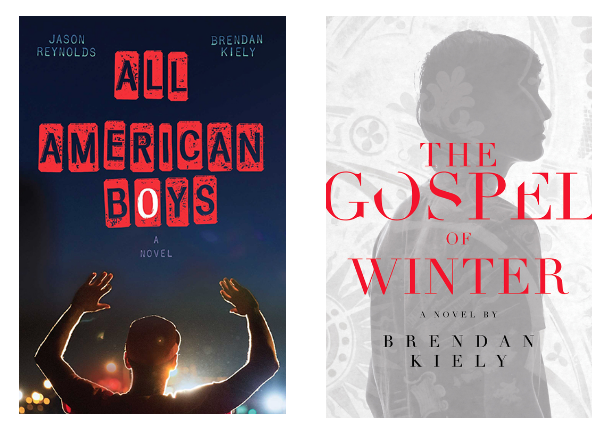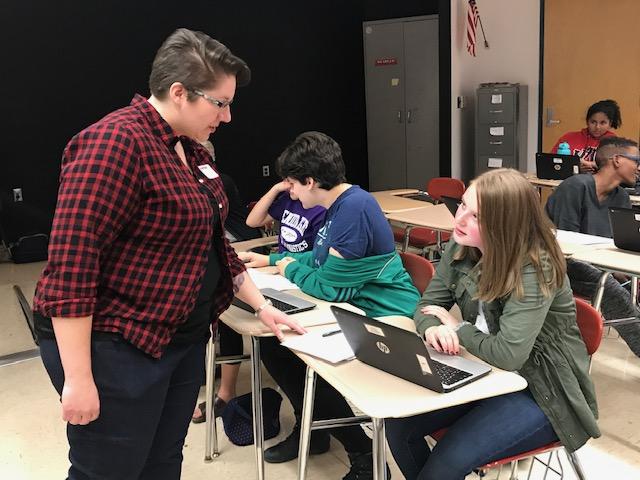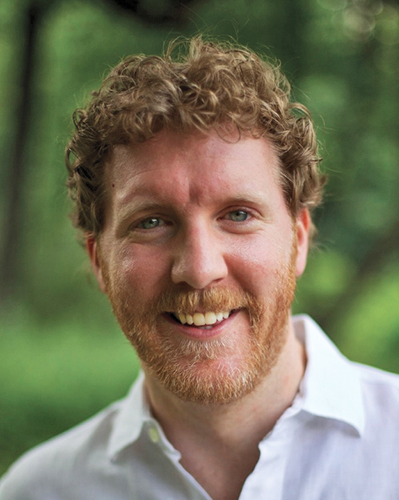
Who is Brendan Kiely?
Brendan Kiely, a realistic fiction, young adult writer, is famous for the works he has written – The Gospel of Winter, Tradition, The Last True Love Story, and All American Boys (co-authored with Jason Reynolds) – and awards he has received – The Coretta Scott King award and The Amelia Elizabeth Walden award. Growing up in Boston, Massachusetts, he now resides in New York City with his wife, as a full time novelist.
Life Before Being an Author
Kiely grew up in an Irish Catholic family, in a part of the country that was predominantly Caucasian; It was considered to be very open minded and liberal. When he was young he dreamed of being a child actor and model. Although he did get hired as young model at a Boston Company after being compared to an “All American Boy,” he instead worked as a paperboy and later pursued teaching high school for about a decade before becoming a full time author.
Kiely discussed the lessons his parents taught him that he still carries with him and that still inform his books, including the value of curiosity and listening to others. He said, “I learned… that I was, in fact, incredibly sheltered, and my understanding of the world was very limited…” He added that some of his childhood heroes might have also been in a similar “bubble” that only showed one side of the story, so Kiely had to challenge himself to, in a sense, get outside of himself, throughout his journey as an author and a person.
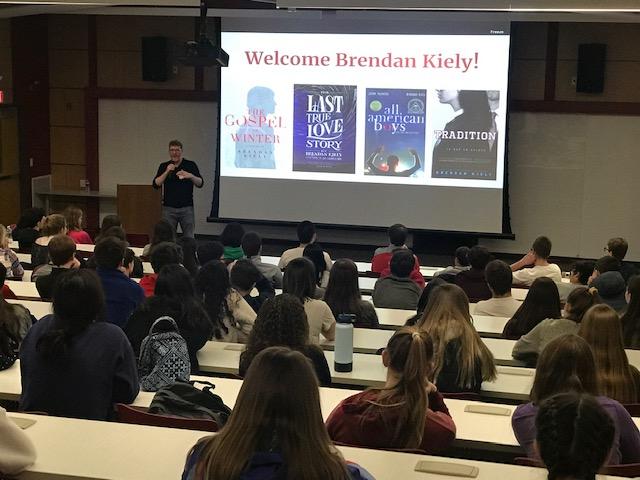
Listening was a very important lesson to Kiely, one he practiced constantly as a teacher, listening to his students that sometimes had similar experiences to those of his characters. When asked about how young adults have influenced him in his writing, he said this: “I’m inspired by teenagers, and so I want to write books that inspire them too.” He continued to say that the ways young adults want to see change in the world is inspiring to him. Kiely further admitted that adults don’t give teenagers the credit they deserve and don’t realize that teenagers want to have these serious conversations — something he learned as a high school teacher.
As Kiely reflected on his position in life being a straight white male, he recognized that a lot of the opportunities and positive interactions he’d had growing up would have been very different if his identity was something other than what it is.
What Does He Write About?
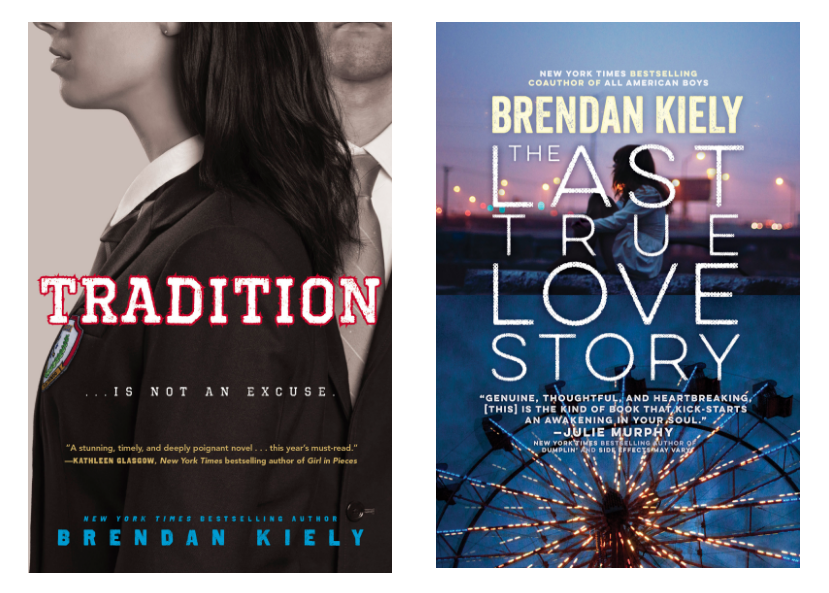
Brendan Kiely’s most well known medium is novels. Regarding genre, he writes dramatic, realistic fiction exploring inequality and social issues faced in the U.S. and the world today. Examples of this include rape culture in his book Tradition, which is about Jules, a schoolgirl who is sexually assaulted at a party and pursues justice. Kiely exposes other pressing issues issues such as police brutality against people of color in All American Boys, in which Quinn, a Caucasian student, sees Rasheed, a black teenager, being assaulted by a police officer without true justification.
Why Does He Write About These Topics?
When questioned about how he came upon writing about inequality and relevant issues to today’s society, and what he hopes to see come out from them, Kiely used All American Boys as an example: “…as Jason and I were becoming friends, it was apparent that if a white man and a black man could tell the story together, we might be able to encourage more healthy conversations about how racism affects us.” He said similar things regarding Tradition, in the sense of needing both sides (people of color and Caucasian people, men and women) to participate in order to fix these issues. Kiely continued on to say that it is our job to listen and “affirm the leadership” of people who have had these experiences, and be “courageously mad with them” about the problems our society allows to happen. In the case that a room is predominately white, or male, or simply won’t listen to the victims of these experiences, we can echo their voices and amplify the truths they tell.
Kiely explained how he hopes his books will impact young people’s views on these issues: “I don’t think it can make the problem(s) go away, because I believe problems can be solved when groups of people can communicate better. What I hope is that my books can do is foster clearer, and more compassionate conversation between disagreeing minds.” Overall, Kiely stressed the importance of aiming to write books with a “listening heart”—based after something his grandmother, the matriarch of the family, told him when she first read his book the Gospel of Winter.
His Writing Process
Kiely’s writing process takes a lot of planning and research, as he writes about such serious topics and wants his writing to be as accurate as possible. Despite this, when reviewing the way he writes amongst other things, he revealed that planning is actually the easiest for him. The process of sitting down to write the first draft is the hardest. Though Kiely admitted writing wasn’t always an easy thing, especially when he got writer’s block, he claimed “even if you do end up throwing out all that work [from the writer’s block], you need words on the page, and you just need to push past it.”
Kiely goes through several drafts before the finished product is ready to publish, though he always tries to keep the first line as genuine and sincere as possible. “I try to write first lines that teach the reader how to read the book… but I think, as a writer, sincerity is my strong suit, and so, for me, I lead with my strong suit. The takeaway line here, I think, is to lead with your strong suit, as a writer,” he said.
When asked how he organizes with his research, Kiely said, “One of the places I keep track of ideas is in notebooks: some on my desk, I have small notebooks that I keep with me in pockets of my coats. Sometimes, when I’m on the go, I’ll jot down things in my phone.” Kiely went on to say that after collecting enough notes, he puts them in a computer folder and labels it with the basic idea of his book, for example, Book About Rape Culture, or Book About Racial Inequality. The other place he keeps notes, Kiely said, was sticky notes—everywhere; on the walls, by his computer, “all over the place.”
During the presentation, Kiely brought up the issue of keeping inspiration when writing, to which he said the following: “I have questions… and I want to try to answer them…” This can be tied in with why he writes, as well as how his writing is significant to him. Following that statement, he went on to say that he likes to bring the protagonist from point A, to point B, so that they may learn to be more knowledgeable and stand up for these issues—essentially, characters that change over time, for the better.
Find Out More About Brendan Kiely
To learn more about Brendan Kiely, visit his website at www.brendankiely.com, or follow him @brendankiely on Twitter or Instagram as he visits different places to speak about the issues he writes about as well as his books.





























